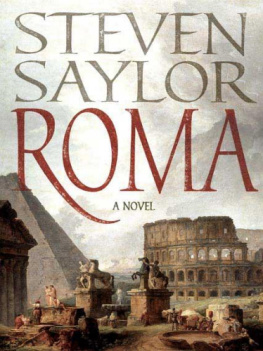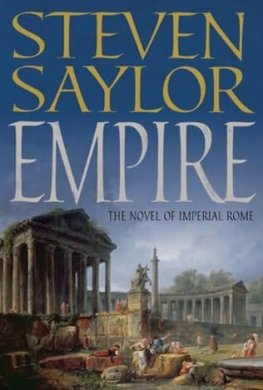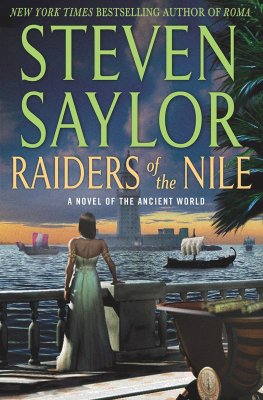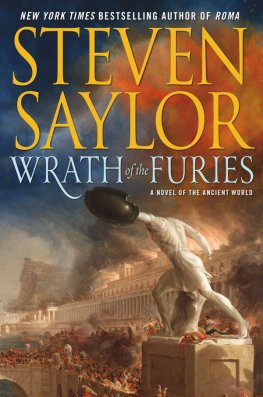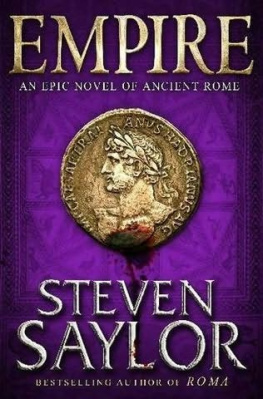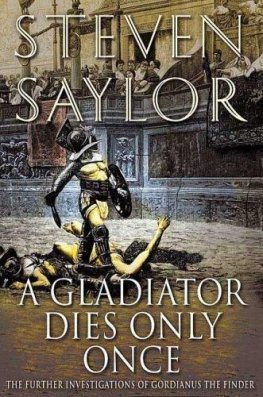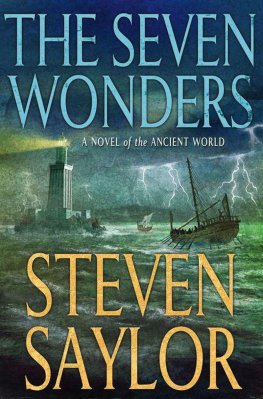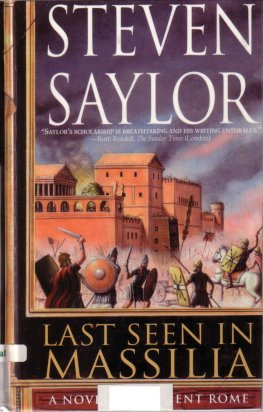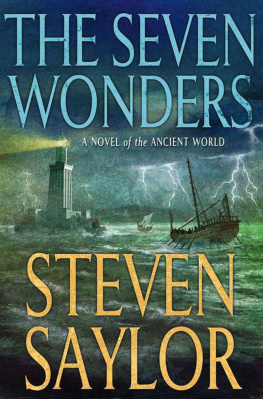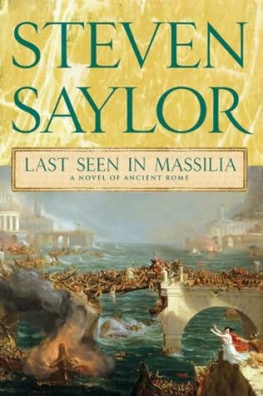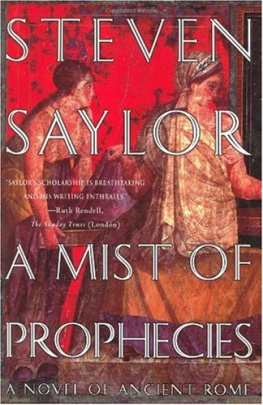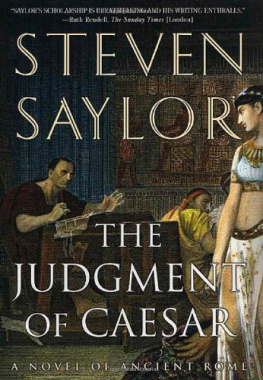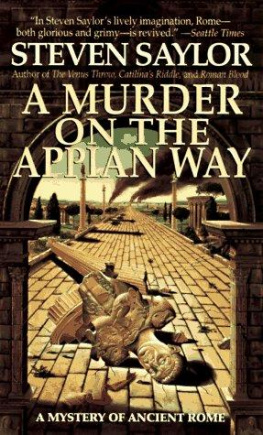Steven Saylor - Rubicon (Novels of Ancient Rome)
Here you can read online Steven Saylor - Rubicon (Novels of Ancient Rome) full text of the book (entire story) in english for free. Download pdf and epub, get meaning, cover and reviews about this ebook. year: 2010, publisher: St. Martins Press, genre: Detective and thriller. Description of the work, (preface) as well as reviews are available. Best literature library LitArk.com created for fans of good reading and offers a wide selection of genres:
Romance novel
Science fiction
Adventure
Detective
Science
History
Home and family
Prose
Art
Politics
Computer
Non-fiction
Religion
Business
Children
Humor
Choose a favorite category and find really read worthwhile books. Enjoy immersion in the world of imagination, feel the emotions of the characters or learn something new for yourself, make an fascinating discovery.
- Book:Rubicon (Novels of Ancient Rome)
- Author:
- Publisher:St. Martins Press
- Genre:
- Year:2010
- Rating:3 / 5
- Favourites:Add to favourites
- Your mark:
- 60
- 1
- 2
- 3
- 4
- 5
Rubicon (Novels of Ancient Rome): summary, description and annotation
We offer to read an annotation, description, summary or preface (depends on what the author of the book "Rubicon (Novels of Ancient Rome)" wrote himself). If you haven't found the necessary information about the book — write in the comments, we will try to find it.
Rubicon (Novels of Ancient Rome) — read online for free the complete book (whole text) full work
Below is the text of the book, divided by pages. System saving the place of the last page read, allows you to conveniently read the book "Rubicon (Novels of Ancient Rome)" online for free, without having to search again every time where you left off. Put a bookmark, and you can go to the page where you finished reading at any time.
Font size:
Interval:
Bookmark:
"Pompey will be mightily pissed," said Davus.
"Son-in-law, you have a penchant for stating the obvious." I sighed and knelt and steeled myself to take a closer look. The lifeless body lay face-down in the middle of my garden directly before the bronze statue of Minerva, like a prostrate worshiper at the goddess's feet.
Davus turned in a circle, shielding his eyes from the morning sunlight and peering warily at the four corners of the peristyle roof surrounding us. "What I can't see is how the assassin got in and out without any of us in the house hearing." He wrinkled his brow, which made him look like a perplexed and much overgrown boy. Built like a Greek statue, and just as thick; that was Bethesda's joke. My wife had not taken kindly to the notion of our only daughter marrying a slave, especially a slave who had been brash enough, or stupid enough, to get her pregnant. But if Davus had a penchant for the obvious, Diana had a penchant for Davus. And there was no denying that they had produced a beautiful son, whom I could hear even now screaming at his mother and grandmother to be let out into the garden, crying as only a two-year-old can. But Aulus could not be let out to play on this bright, mild Januarius afternoon, for there was a corpse in the garden.
And not just any corpse. The dead man was Numerius Pompeius, who was somehow related to Pompey- one of the Great One's cousins, though a couple of generations younger. He had arrived at my house, alone, half an hour earlier. Now he lay dead at my feet.
"I can't understand it." Davus scratched his head. "Before I let Numerius in the door, I took a good look up and down the street, like I always do. I didn't notice anybody following him." When Davus had been a slave, it was Pompey who had owned him, and Davus had been a bodyguard- an obvious choice, given his hulking physique. He had been trained not just to fight but to keep a lookout for danger. As my son-in-law, Davus was the physical protector of the household, and in these perilous times it was his job to greet visitors at the door. Now that a murder had occurred within the house, practically under his nose, he took it as a personal failure. In Pompey's service, such a lapse would have called for a harsh interrogation, at the least. In the face of my silence, Davus seemed determined to interrogate himself. He paced back and forth, using his fingers to tick off each question.
"Why did I let him in? Well, because I knew him by sight, back from my days with Pompey. He was no stranger; he was Numerius, my former master's favorite young cousin, who always had a good word for everyone. And he came alone- not even a bodyguard to worry about- so I didn't see any need to make him wait outside. I let him into the foyer. Did I ask if he had any weapons? It's against the law to carry weapons inside the city walls, of course, but nobody pays attention to that these days, so yes, I did ask, and he didn't make any fuss at all and handed over his dagger right away. Did I search him for more weapons, as you've told me to do, even with citizens? Yes, I did, and he didn't even protest. Did I leave him alone, even for a moment? No, I did not. I stayed with him there in the foyer, sent little Mopsus to tell you there was a visitor, then waited until you sent back word that you'd see him. I escorted him through the house, back here to the garden. Diana and Aulus were out here with you, playing in the sunny spot at Minerva's feet right where Numerius is lying now but you sent them inside. Did I stay with you? No, because you sent me inside, too. But I knew better! I should have stayed."
"Numerius said he had a message for my ears alone," I said. "If a man can't safely have a private talk in his own home" I looked about the garden, at the carefully pruned shrubbery and the brightly colored columns that lined the surrounding walkway. I gazed up at the bronze statue of Minerva; after all these years, the face that peered down from her great war helmet remained inscrutable to me. The garden was at the center of the house, its heart- the heart of my world- and if I was not safe here, then I was safe nowhere.
"Don't chastise yourself, Davus. You did your job. You knew that Numerius was whom he claimed to be, and you took his weapon."
"But Pompey would never be left unguarded, even for-"
"Have we reached a point where a common citizen needs to mimic Pompey or Caesar, and have a bodyguard standing over him every moment of every hour, even when he's wiping his ass?"
Davus frowned. I knew what he was thinking- that it was unlike me to talk so crudely, that I must be badly shaken and trying not to show it, that his father-in-law was getting too old to deal with ugly shocks like a corpse in the garden before the midday meal. He stared up at the rooftop again. "But Numerius wasn't the danger, was he? It was whoever followed him here. The fellow must be half lizard, to scurry up and down the walls without making a sound! Did you hear nothing, father-in-law?"
"I told you, Numerius and I talked for a while, then I left him for a moment and stepped into my study."
"But that's only a few feet away. Still, I suppose the statue of Minerva might have blocked the view. And your hearing-"
"My ears are as sharp as those of any man of sixty-one!"
Davus nodded respectfully. "However it happened, it's a good thing you weren't out here when the assassin came, or else"
"Or else I might have been strangled, too?" I touched my fingers to the rope that still circled Numerius's neck, cutting into the livid flesh. He had been killed with a simple garrote, a short loop of rope attached to each end of a short, stout twisting stick.
Davus knelt beside me. "The killer must have come up behind him, dropped the garrote over his head, then used the stick to twist it tighter and tighter around his throat. A gruesome way to die."
I turned away, feeling queasy.
"But a quiet way," Davus went on. "Numerius couldn't even cry out! Maybe he managed a gurgle or a grunt at the start, but then, with his air cut off, the only way to make a sound would be to bang against something. See there, father-in-law, how Numerius gouged his heels into the gravel? But that wouldn't make much noise. If only he could have banged a fist against the bronze Minerva but both hands are clutched to his throat. That's a man's instinct, to try to tear the rope from his neck. I wonder" Davus peered up at the roof again. "The killer needn't have been a big fellow. It doesn't take a great deal of strength to garrote a man, even a big man, so long as you take him unaware."
"Do you speak from experience, son-in-law?"
"Oh, I learned lots of things like that, training to be Pompey's bodyguard." Davus smiled at me crookedly, then saw the look on my face. His smile vanished. "You don't think that I- "
"Of course not. But I wonder- might such an idea occur to Pompey? Is there any reason for you to bear a grudge against Pompey? Something I don't know about? When you were his slave, did he ever mistreat you?"
"No, father-in-law. Have I ever complained about him? He was a good master." Davus managed another crooked smile. "Besides, wasn't it Pompey who lent me to you, back during the Clodian riots, to guard the house- and wasn't that how I came to know Diana, and" He flushed.
Pompey lent you to me, you became my daughter's secret lover, the two of you made a baby- and then it was up to me either to sue Pompey for damages and see you flogged to death, or else acquire you from Pompey, set you free, and make you my son-in-law. It's I who should bear a grudge against Pompey! I thought this, but did not say it.
"I only mean to say," Davus stumbled on, "that I harbor only good will toward Pompey, as he must know, if he ever gives me any thought at all."
Font size:
Interval:
Bookmark:
Similar books «Rubicon (Novels of Ancient Rome)»
Look at similar books to Rubicon (Novels of Ancient Rome). We have selected literature similar in name and meaning in the hope of providing readers with more options to find new, interesting, not yet read works.
Discussion, reviews of the book Rubicon (Novels of Ancient Rome) and just readers' own opinions. Leave your comments, write what you think about the work, its meaning or the main characters. Specify what exactly you liked and what you didn't like, and why you think so.

